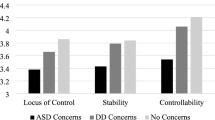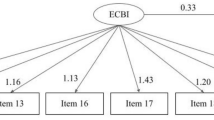Abstract
We add to current understanding of maternal cognitions and attributions about their children with disruptive behaviors by describing and exploring mothers’ naturalistic characterizations of their children. Participating mothers from Cuba, Puerto Rico and the Dominican Republic had 4- to 10-year-old children with disruptive behaviors. Data were collected with a structured interview that included open-ended questions, optional probes, questions with set response categories, and rating scales. Both qualitative and quantitative analyses were conducted. The three most common characterizations were “intelligent,” “malcriado,” (spoiled/rude mannered) and “carácter fuerte” (stubborn/willful). Cultural informants sorted these and other descriptors used by mothers into categories of their choosing which provided a basis for classifying maternal characterizations. These characterizations were statistically and significantly associated with the onset of maternal concerns, with the number of members from the mothers’ social network who suggested professional services, with maternal perceptions of stigma, and with maternal ratings of the severity of the children’s symptoms. Overall, mothers’ naturalistic characterizations were structured differently from researcher dimensions typically used to study maternal cognitions about child behavior.
Similar content being viewed by others
References
Angel, R., & Thoits, P. (1987). The impact of culture on the cognitive structure of illness. Culture Medicine and Psychiatry, 11, 465–494.
Angold, A., Messer, S., Stangl, D., Farmer, E. M. Z., Costello, E. J., & Burns, B. J. (1998). Perceived parental burden as a predictor of service use for child and adolescent psychiatric disorders. American Journal of Public Health, 88, 75–80.
Angold, A., Patrick, M. K. S., Burns, B. J., & Costello, E. J. (1996). The Child and Adolescent Impact Assessment (CAIA), Parent Interview (Version 2 ed.). Duke University Medical Center: Developmental Epidemiology Program, Department of Psychiatry and Behavioral Sciences.
Arcia, E., & Fernández, M. C. (1998). Cuban mothers’ schemas of ADHD: Development, characteristics and help seeking behavior. Journal of Child and Family Studies, 7, 333–337.
Arcia, E., & Fernández, M. C. (2003). From awareness to acknowledgment: The development of concern among Latina mothers of children with disruptive behaviors. Journal of Attention Disorders, 6, 163–175.
Arcia, E., & Johnson, A. (1998). When respect means to obey: Immigrant Mexican mothers’ values for their children. Journal of Child and Family Studies, 7, 79–95.
Baden, A. D., & Howe, G. W. (1992). Mothers’ attributions and expectancies regarding their conduct-disordered children. Journal of Abnormal Child Psychology, 20, 467–485.
Breen, M. J., & Altepeter, T. S. (1991). Factor structures of the home situations questionnaire and the school situations questionnaire. Journal of Pediatric Psychology, 16, 59–67.
FolioCorporation. (1999). Folio VIEWS (Version 4). Provo, UT: Folio Corporation.
Gaskins, S. (1996). How Mayan parental theories come into play. In S. Harkness & C. M. Super (Eds.), Parents’ cultural belief systems: Their origins, expressions, and consequences (pp. 345–363). New York, NY: Guilford.
Guarnaccia, P. J., & Rogler, L. H. (1999). Research on culture-bound syndromes: New directions. American Journal of Psychiatry, 156, 1322–1327.
Harkness, S., & Super, C. M. (1992). Parental ethnotheories in action. In I. E. Sigel, A. V. McGillicuddy-DeLisi, & J. J. Goodnow (Eds.), Parental belief systems: The psychological consequences for children (2nd ed., pp. 373–391). New Jersey: Erlbaum.
Harwood, R. L., Schoelmerich, A., Ventura-Cook, E., Schulze, P. A., & Wilson, S. P. (1996). Culture and class influences on Anglo and Puerto Rican mothers’ beliefs regarding long-term socialization goals and child behavior. Child Development, 67, 2446–2461.
Hoza, B., Owens, J., Pelham, W., Swanson, J., Conners, C., Hinshaw, S., et al. (2000). Parent cognitions as predictors of child treatment response in attention-deficit/hyperactivity disorder. Journal of Abnormal Child Psychology, 28, 569–583.
Johnston, C., & Freeman, W. (1997). Attributions for child behavior in parents of children without behavior disorders and children with attention deficit-hyperactivity disorder. Journal of Consulting and Clinical Psychology, 65, 636–645.
Johnston, C., & Patenaude, R. (1994). Parent attributions of inattentive-overactive and oppositional-defiant child behaviors. Cognitive Therapy and Research, 18, 261–275.
Klasen, H. (2000). A name, what’s in a name? The medicalization of hyperactivity, revisited. Harvard Review of Psychiatry, 7, 334–344.
Kohnstamm, G. A., Halverson, C. F., Jr., Havill, V., & Mervielde, I. (1996). Parents’ free descriptions of child characteristics: A cross-cultural search for the developmental antecedents of the big five. In S. Harkness & C. M. Super (Eds.), Parents’ cultural belief systems: Their origins, expressions, and consequences (pp. 27–55). New York, NY: Guilford.
Reimers, T. M., Wacker, D. P., Derby, K. M., & Cooper, L. J. (1995). Relation between parental attributions and the acceptability of behavioral treatments for their child’s behavior problems. Behavioral Disorders, 20, 171–178.
Slep, A. M., & O’Leary, S. G. (1998). The effects of maternal attributions on parenting: An experimental analysis. Journal of Family Psychology, 12, 234–243.
Sobol, M. P., Ashbourne, D. T., Earn, B. M., & Cunningham, C. E. (1989). Parents’ attributions for achieving compliance from attention-deficit-disordered children. Journal of Abnormal Child Psychology, 17, 359–369.
Sonuga-Barke, E. J., & Balding, J. (1993). British parents’ beliefs about the causes of three forms of childhood psychological disturbance. Journal of Abnormal Child Psychology, 21, 367–376.
Author information
Authors and Affiliations
Corresponding author
Rights and permissions
About this article
Cite this article
Arcia, E., Fernández, M.C. & Jáquez, M. Latina Mothers’ Characterizations of Their Young Children with Disruptive Behaviors. J Child Fam Stud 14, 111–125 (2005). https://doi.org/10.1007/s10826-005-1126-8
Issue Date:
DOI: https://doi.org/10.1007/s10826-005-1126-8




